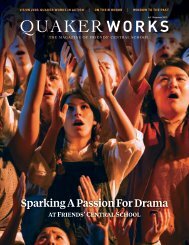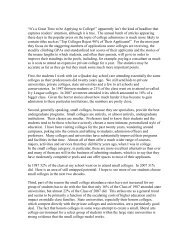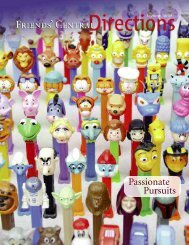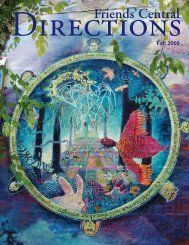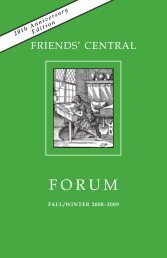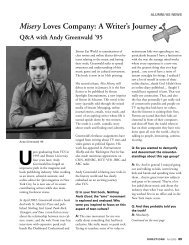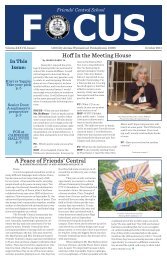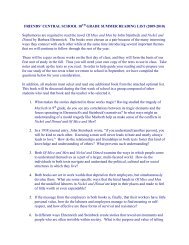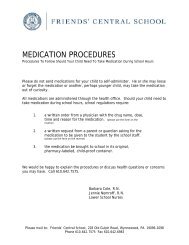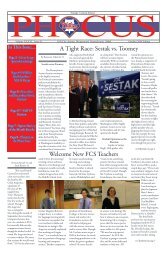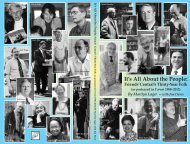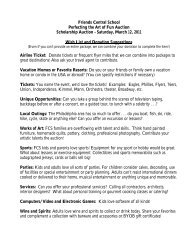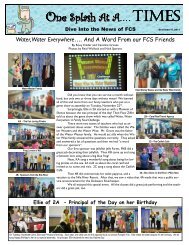2006-2007 Fall/Winter Directions - Friends' Central School
2006-2007 Fall/Winter Directions - Friends' Central School
2006-2007 Fall/Winter Directions - Friends' Central School
Create successful ePaper yourself
Turn your PDF publications into a flip-book with our unique Google optimized e-Paper software.
CAMPUS LOG – UPPER SCHOOL<br />
Roles, Rules, and Revolutions: Thinking About Gender<br />
Anna Rosenblatt ’08 and Rachel Erulkar ’08, Terry Guerin<br />
Do you remember Men Are<br />
From Mars, Women Are From<br />
Venus? Even if you never read the<br />
book, the phrase probably has the familiarity<br />
of an echo. After all, it’s no secret<br />
that men aren’t comfortable with tears<br />
and women hate to channel surf, or that<br />
men don’t ask for directions and women<br />
take forever to get dressed. But just a<br />
minute: are the differences between the<br />
genders really that simple?<br />
This fall, Friends’ <strong>Central</strong> Upper<br />
<strong>School</strong> students spent an entire day probing<br />
the role and validity of common<br />
assumptions about gender differences.<br />
The program, entitled “Roles, Rules, and<br />
Revolution: An Examination of Gender at<br />
Friends’ <strong>Central</strong> and in the World” was<br />
designed by Upper <strong>School</strong> English<br />
teacher, Al Vernacchio, and featured a<br />
school-wide survey, student-led discussion<br />
groups, faculty-organized workshops (on<br />
topics such as the legacy of Title IX, biochemical<br />
differences between male and<br />
female brains, and the effect of gender on<br />
friendship), two ten-minute plays, and a<br />
talk by Friends’ <strong>Central</strong> alumna, Maggie<br />
Schmitt ’94, on her work with international<br />
social movements. There were arguments,<br />
reflection, laughter, and a chance<br />
for everyone to ask him or herself: “What<br />
is it I think about gender and my own<br />
place in the world?”<br />
30 DIRECTIONS <strong>Fall</strong> <strong>2006</strong> / <strong>Winter</strong> <strong>2007</strong><br />
Schmitt, who is living in<br />
Madrid and pursuing a<br />
PhD, encapsulated the<br />
impulse behind the program<br />
when she stated, “We all<br />
have and live in gender. It<br />
makes us who we are. But<br />
adolescence is all about<br />
wrestling and negotiating<br />
with the way rules and roles<br />
are imposed, the need to<br />
find your way between<br />
them, to rebel against them<br />
even as you are being shaped<br />
by them.”<br />
Schmitt has made a<br />
career out of such wrestlings<br />
and negotiations, both<br />
studying and supporting social movements<br />
because, as she explains, they represent<br />
individuals reaching bravely beyond<br />
themselves to imagine change of all sorts<br />
both personal and social. Her message to<br />
Maggie Schmitt ’94<br />
the students was to use “gender day” as a<br />
chance to think about their bodies as a<br />
place where politics happen. “Take your<br />
own experiences seriously,” she urged her<br />
audience. “Dare to ask what works for<br />
me? What do I wish was different? And<br />
have the courage to hear what your peers<br />
have to say about their own, perhaps very<br />
different, experiences.”<br />
Vernacchio, who teaches a course on<br />
sexuality and society, has been thinking<br />
about gender and Friends’ <strong>Central</strong> for<br />
several years. When he learned that Terry<br />
Guerin had chosen The Women as the fall<br />
Al Vernacchio<br />
play and he heard the early grumblings<br />
about the cross-gender casting, he knew<br />
he had found a great starting point for the<br />
discussion.<br />
Together with some of his students, he<br />
developed a survey that explored prevalent<br />
attitudes about gender differences. The<br />
survey was sent to all Upper <strong>School</strong> students<br />
and faculty, and while the 250<br />
responses did not reveal any startling<br />
results, they became the basis for honest,<br />
unthreatening discussions in the small,<br />
student-led groups. In one discussion, the<br />
students bantered about the amount of<br />
time they each spent getting dressed in<br />
the morning. In another, a statement on<br />
the survey that boys take up more physical<br />
space than girls prompted a lively<br />
exchange. One boy quickly disagreed with<br />
the pejorative tone of the statement, but a<br />
girl laughingly pointed out that he himself<br />
was sprawled out in his chair with his<br />
legs spread wide on either side of the<br />
desk.<br />
When Terry Guerin introduced the<br />
two ten-minute skits, “Babe” and<br />
“Beauty,” she emphasized the importance<br />
of a sense of humor. “You can and will<br />
laugh,” she said. “But I want you to ask<br />
yourselves—what assumptions and<br />
impulses make us laugh? What is the kernel<br />
of truth buried in our laughter?” This<br />
is not an easy question for anyone, let<br />
alone teenagers, to ask. But “Roles, Rules,<br />
and Revolutions” provided Friends’<br />
<strong>Central</strong> students with a safe place to talk<br />
about gender-based differences (and similarities),<br />
self and public image, and the<br />
way so much of our lives are determined<br />
by socially ingrained assumptions.



